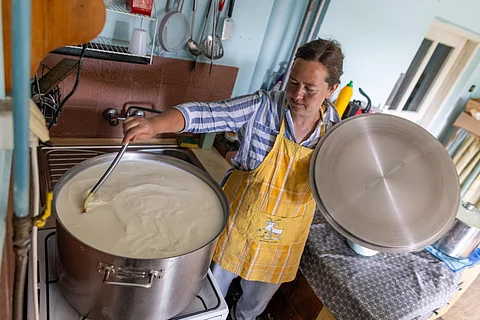
- NEWS
- the EDIT
- COMMENTARY
- BUSINESS
- LIFE
- SHOW
- ACTION
- GLOBAL GOALS
- SNAPS
- DYARYO TIRADA
- MORE

BALAZOWKA (AFP) — With a smile enveloped by steam rising from a pot of milk simmering on a stove, Yulia Bachurinskaya reminisces about the moment she fell “deeply in love” with cheese.
The Belarusian cheesemaker traces the start of this love affair back to trips to Italy as a child in the mid-1990s.
The tours were organized by a nonprofit organization helping Belarusian children like her who grew up in the zone contaminated by the 1986 Chernobyl nuclear disaster.
“The farmers made ricotta the old-fashioned way,” she said of the experience that prompted her to learn both Italian and the art of traditional cheese making.
And then in central France’s Auvergne — home to some of the nation’s most beloved cheeses such as Saint-Nectaire, Cantal and Fourme d’Ambert — she discovered the “obligatory plate of cheese enjoyed after each meal.”
These experiences set Bachurinskaya, alongside her husband, on a lifelong journey dedicated to making cheese, both before and after fleeing political repression in Belarus and resettling in Poland.
“We can’t see our parents, or go back,” said the 40-year-old from the city of Gomel in southeastern Belarus.
“But we can’t think about that all of the time, we have to move forwards,” she added.
Bachurinskaya and her husband Alexei Kuchko, 42, remain in frequent contact with many other exiles, with whom they speak their native Belarusian rather than the Russian language preferred by the government back home.
Hundreds of thousands have fled the country in the last few years following a crackdown on protests after President Alexander Lukashenko claimed victory in a 2020 presidential election that rights groups said was fraudulent.
The couple arrived in Poland in late 2021 and are now settled on a farm in the village of Balazowka in the Carpathian Mountains, where they live alongside 37 sheep and five goats.
The couple have been making cheese since ditching their office jobs in Minsk — Bachurinskaya was a translator from Italian and Kuchko worked in marketing — and settling in the northern Belarus countryside in 2015.
Their efforts paid off with the duo specializing in farm-to-table artisanal cheese in a country where the agricultural sector remains largely linked to its collectivist past and where most farms are state-owned.
In their kitchen, they make around 10 varieties of cheese by hand, including one creation that Bachurinskaya says combines the “piquant taste of goat cheese with the creaminess of brie.”
